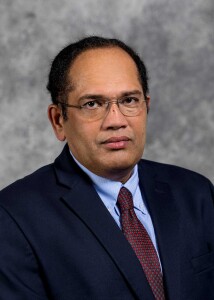South Dakota State University will serve as the lead institution for a new research partnership—the Center for Climate-Conscious Agricultural Technologies—focused on developing environmentally friendly fertilizer to mitigate climate change.
Researchers from SDSU will use a four-year, $4 million EPSCoR Track-2 award from the National Science Foundation to work with colleagues from North Dakota State University, the South Dakota School of Mines and Technology and Sitting Bull College.
The center aims to develop microbial fertilizers—an alternative to expensive and environmentally harmful synthetic fertilizers—while addressing the challenges of crop nutrient management in both North and South Dakota.
“We will focus on how using soil can play a critical role in reducing the effects of climate change and supporting ecosystems,” said Srinivas Janaswamy, associate professor in SDSU’s Department of Dairy and Food Science and the primary investigator for the grant. “Climate-friendly and sustainable crop nutrition solutions are required to boost rural farms’ economic and environmental stewardship.”
Synthetic nitrogen fertilizers were instrumental in transforming the world’s global food supply during the second half of the 20th century, allowing for large-scale farming operations and increased crop yields.
Today, researchers know that synthetic fertilizers have high production costs, contribute to greenhouse gas emissions, pollute lakes, rivers and streams, and have adverse socioeconomic impacts.
“The continuous use of chemical fertilizers to increase food production is unsustainable as they consume nearly 1% of the world’s energy and contribute to 3-5% of greenhouse gas production,” Janaswamy explained.
He and his team of multidisciplinary researchers plan to develop a microbial biofertilizer to be used in crop production with a particular focus on corn, the prevailing crop in South Dakota.
“Microbial biofertilizers offer an easily adoptable alternative to synthetic fertilizers,” Janaswamy said.
The research team will source the needed materials from the roots of corn and other widely farmed crops in South Dakota. Beads, from locally sourced biopolymers, will encapsulate the microbial fertilizer to give it a “metabolic and competitive advantage” when added to the soil.
“Using environmentally friendly beads to encapsulate the microbes is really the novelty here,” Janaswamy noted. “The ability to use locally derived biopolymers for the beads will build the rural circular economy engines.”
The research team will collaborate with farmers from rural communities and crop producers on Native American reservations to understand their needs and preferences. This collaborative process will hopefully lead to widespread implementation and, subsequently, will increase profitability.
“The project will build a thriving team that will contribute to a continuum of climate-friendly solutions for crop nutrition; develop a well-equipped, future-ready workforce; and positively impact the socio-economic growth of the rural Dakotas,” Janaswamy said.







